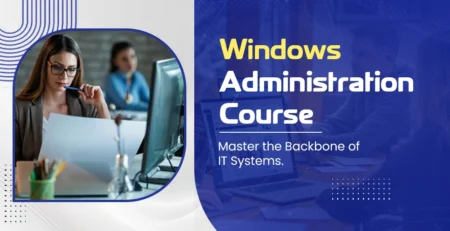Disclosing Opportunities | Top Advantages to Enroll in a DevOps Course Online
If you are looking for the significant benefits of a DevOps course online, you are on the perfect blog. However, before indulging in the blog, let’s discuss what DevOps is so that you will get a brief understanding of it.
Therefore, DevOps is a software development method in which the development team (Dev) and the operations department (Ops) collaborate throughout all phases of software development. They are product design, development, testing, deployment, and support.
Furthermore, DevOps is sometimes regarded as a spin-off of Agile and Lean methodologies, as it ensures the same quality review and assurance as these methodologies provide. Developers and operations used to work in isolation before the Agile methodology was introduced. The developers created the product, and operations handled all subsequent processes.
Additionally, the damage caused by this strategy gave rise to the Agile and DevOps movements. DevOps builds on Agile further by focusing on the successful delivery of software that is entirely functional throughout each iteration. It helps minimize the frustration of both the internal teams developing the product and the end-user.
Furthermore, in this comprehensive blog, we will discuss the fundamental benefits of enrolling in the AWS DevOps course to build a successful career in the IT field. Likewise, we will also examine the detailed syllabus of DevOps courses offered by Rexton IT Solutions, including their career opportunities. So, let’s get started with the blog.
Top Benefits of Enrolling in a DevOps Course Online
Every person involved in software development, whether on the development side or the operations side, will gain significantly by learning DevOps. Moreover, based on your skill and experience level, you may register for the Devops course certification to obtain career advantages like:
1. Reduce Production Cycles
Siloed ops and dev teams extend the production cycle for too long. Moreover, it becomes increasingly complex for the two teams to collaborate on the processes necessary to get the software up and running. Likewise, more secured coordination, achieved through the removal of silos, accelerates innovation and development and growth.
2. Boost Deployment Success Rates
Coding bugs are the leading cause of deployment failures. Thus, the DevOps method facilitates the frequent release of code, allowing for problem detection at an earlier stage. Likewise, since AWS Devops teams collaborate, recovery takes a significantly shorter duration.
3. Enhanced Collaboration and Communication
DevOps course has transformed the culture of software development. However, it is because when all stakeholder teams are involved in the development process, they focus on a single goal rather than managing multiple objectives. More corporation enhances communication and improved communication leads to smoother development cycles, faster error detection/correction, and a more accelerated route to market.
4. Greater Efficiency Through Automation
Continuous integration minimizes manual intervention in development and testing. Specific activities in the development process cannot be automated. DevOps course draws the developers’ attention towards those activities, so tools can handle the remaining activities that speed up development, such as:
- Cloud-based platforms use hardware resources during development, which can unnecessarily occupy the corresponding system infrastructure. Scalable infrastructures, such as cloud-based platforms, eliminate this issue, leading to faster processes.
- Construct acceleration tools that compile code more quickly.
- Parallel workflow processes are utilized to ensure the smooth operation of the continuous delivery chain.
5. Develop with Good Developers
Destructive code is far too prevalent, although, that users have come to this conclusion after it’s too late. The truth is that there are developers who excel at their jobs and those who struggle with coding. DevOps course online offers a fix to this issue. During this course, you will learn that regular review facilitates the easier evaluation of developer performance in a DevOps team, ensuring that every member is assigned duties most appropriate for their capabilities.
Moreover, DevOps recognizes that the software development process encompasses more than just coding. There are numerous other jobs involved in it. A terrible coder could be good at any one of the various jobs, and a good coder may not necessarily be good at any other job. Re-tasking team members upfront helps avoid the wastage of time and resources.
Comprehensive Syllabus of DevOps Course offered by Rexton IT Solutions
| Module | Topics Covered | Key Tools / Technologies | Outcomes / Skills You Gain |
| 1. Introduction to DevOps | What is DevOps? DevOps lifecycle & principles; Differences vs. traditional IT; DevOps tools overview; Roles & responsibilities in DevOps workflows. |
N/A (conceptual) | Understanding of DevOps culture; ability to articulate why and how DevOps is used in organizations. |
| 2. Version Control with Git & GitHub | Installing & configuring Git; basic Git commands (clone, commit, push, pull, merge); branching strategies (GitFlow, feature branching); remote repositories; integrating Git with CI/CD tools. |
Git, GitHub | Ability to manage code versions, collaborate in teams, maintain branches, perform merges, and manage remote repos. |
| 3. Build Automation / CI using Jenkins | What is continuous integration? Installing/configuring Jenkins; job types (freestyle jobs, pipelines); pipeline scripting (Jenkinsfile, Groovy); integration with Git; plugins. |
Jenkins, Jenkinsfile | Automate builds/tests; build pipelines; understand and use CI tools in real workflows. |
| 4. Configuration Management | Introduction to tools like Ansible (and possibly others); writing playbooks, roles, inventories; automating provisioning; differences vs Chef/Puppet. |
Ansible (plus awareness of Chef/Puppet) | Ability to configure servers automatically, reduce manual work, and provision reproducible environments. |
| 5. Containerization with Docker | Understanding containers; Docker architecture; building images & containers; Dockerfile; networking; volumes; Docker Compose; using container registries. |
Docker, Docker Compose, Docker Hub | Containerize applications; manage container lifecycle; set up local multi-container environments. |
| 6. Orchestration (Kubernetes / AWS ECS / EKS etc.) | Kubernetes architecture: pods, deployments, services; config maps & secrets; Helm charts; using managed Kubernetes (e.g. AWS EKS or equivalents); possibly AWS ECS. |
Kubernetes, Helm, AWS EKS/ECS | Deploy scalable containerized applications; manage orchestration; use Helm for package management. |
| 7. Infrastructure as Code (IaC) | Introduction to IaC; AWS CloudFormation templates & stacks; basics of Terraform; modules; comparison of CloudFormation vs Terraform. |
AWS CloudFormation, Terraform | Define and provision infrastructure in code; automate infrastructure deployments; use best practices in IaC. |
| 8. Continuous Monitoring & Logging | Monitoring tools: AWS CloudWatch (metrics, dashboards, alarms, logs); possibly third-party tools; log management; setting up alerts and dashboards. |
AWS CloudWatch, ELK / other logging tools | Monitor applications/services; detect issues; maintain logs and dashboards; proactively alert. |
| 9. Security in DevOps (DevSecOps) | IAM roles/users/policies; secret management; integrating security in CI/CD pipelines; best practices for secure deployments. |
AWS IAM, AWS Secrets Manager (or equivalents) | Build pipelines that include security; understand how to manage access and credentials; add security from early stages. |
| 10. Serverless / Advanced / Cloud-Specific Modules | AWS Lambda & serverless functions; triggers (API Gateway, S3, etc.); deploying serverless; using serverless in pipelines; cloud platform comparisons; cloud services basics (compute, storage, networking). |
AWS Lambda, AWS core services, etc. | Ability to build serverless applications; understand cloud infrastructure; deploy using best practices. |
| 11. Real-World Projects / Capstone | Building full CI/CD pipelines, deploying microservices, provisioning infrastructure, setting up monitoring, and integrating projects to tie together most/all modules. |
All tools learned | Hands-on experience; portfolio-worthy projects; readiness for job roles. |
| 12. Certification / Interview / Job Prep | Exam preparation (AWS DevOps Engineer, Azure DevOps, etc.); mock interviews; resume building;Q&A; guidance for certifications. |
Relevant certification outlines | Increased chances of clearing certification exams; improved soft skills; better preparedness for job applications. |
Job Profiles to Opt for After Completing the DevOps Course Online
| Certification | Type / Focus |
|---|---|
| AWS Certified: DevOps Engineer – Professional | Advanced DevOps on the AWS platform |
| Microsoft Certified: DevOps Engineer – Expert | Advanced DevOps on Microsoft Azure |
| Google Certified: DevOps Engineer – Professional | Advanced DevOps on Google Cloud |
| DevOps Security: DevSecOps | Security-focused DevOps (DevSecOps practices) |
| Docker Certified Associate | Docker containers administration and usage |
| Certified Kubernetes Administrator (CKA) | Kubernetes administration and orchestration |
| Certified Kubernetes Security Specialist (CKS) | Kubernetes security and best practices |
Final Words!
As we are all familiar with the fact that development speed and business skills should be a priority for every IT or IT-centric company. Furthermore, such skills can only be developed by simplifying interactions between the development and operations teams to promote a healthy DevOps culture.
However, the approach will not be practical if DevOps teams do not comprise the right roles and responsibilities. Additionally, it is imperative to learn DevOps and add value to contribute to your organization. Moreover, at Rexton IT Solutions, our DevOps course online will provide you with an expert level of expertise, covering all DevOps topics, tools, and principles. Likewise, we also offer one-to-one live sessions with expert instructors, provide reading materials, and a guaranteed placement in this field. So, what are you waiting for? Enroll in our DevOps course program today!











